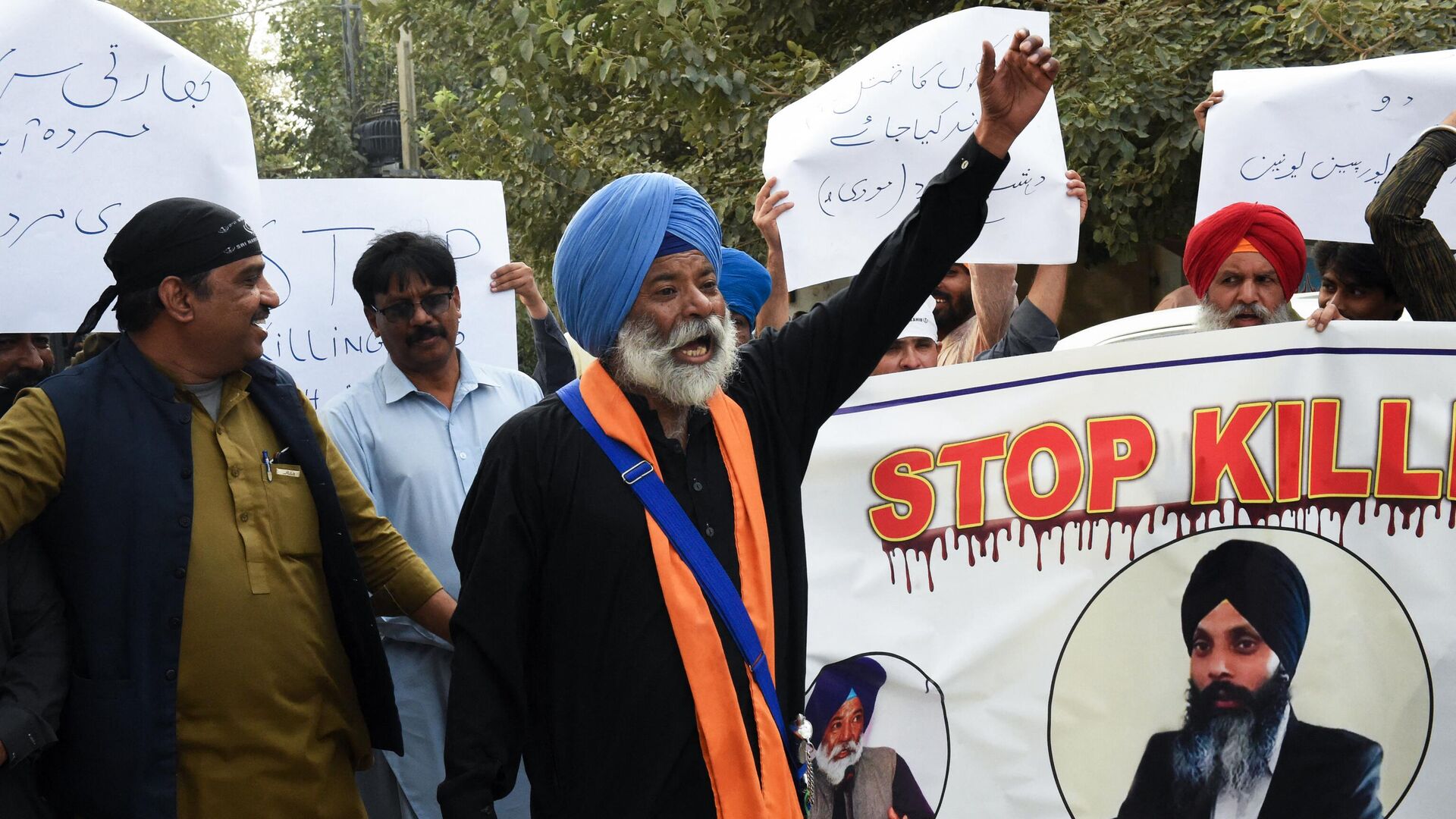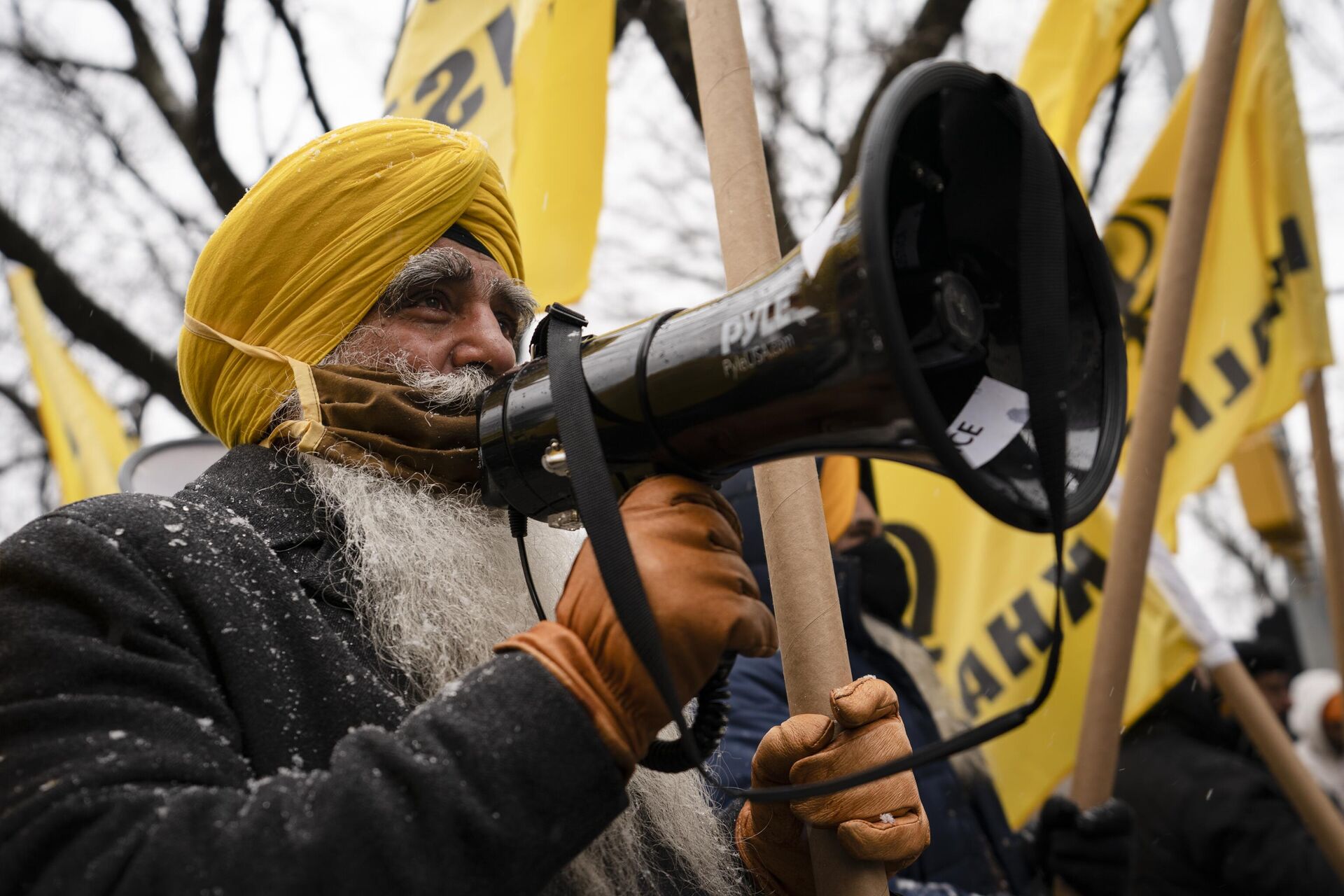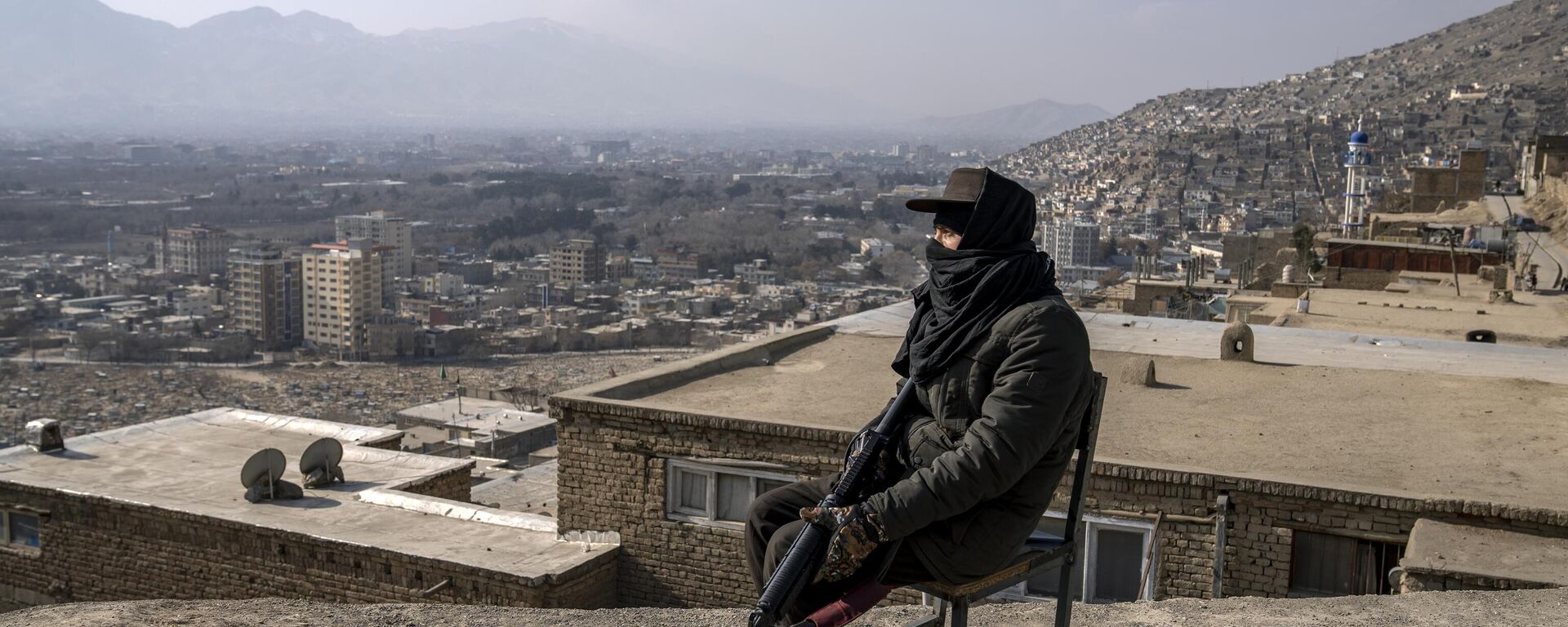https://sputniknews.in/20231213/balkanisation-of-south-asia-unveiling-separatist-movements-in-india-and-pakistan-5795414.html
Balkanisation of South Asia? Unveiling Separatist Movements in India and Pakistan
Balkanisation of South Asia? Unveiling Separatist Movements in India and Pakistan
Sputnik India
India and Pakistan have been dealing with the separatist and militant groups for many decades, with both neighbors exchanging mutual accusations of supporting insurgencies and terror on each other's territories.
2023-12-13T17:52+0530
2023-12-13T17:52+0530
2023-12-13T20:11+0530
justin trudeau
pakistan
india
balochistan
indira gandhi
inter-services intelligence (isi)
taliban
baloch people
separatism
sikhs
https://cdn1.img.sputniknews.in/img/07e7/0c/0d/5821360_0:0:3072:1728_1920x0_80_0_0_b79b2e7cbc7c5dad57f74f92c03189d5.jpg
In a recent incident that garnered significant media attention, Sikh separatist leader Hardeep Singh Nijjar was killed on Canadian soil.The circumstances surrounding his death remain unclear, adding to the complexity of the situation.More to that: the US media and political establishment have openly accused the Indian government of "plotting to kill" another extremist, Gurpatwant Singh Pannun, who resides in New York City and leads the Khalistan extremist group called 'Sikhs for Justice'.West Takes Sikh Issues Seriously — But Turns Blind Eye to Baloch PeopleOn the Pakistani side, Baloch people have been leading widespread protests across the country in recent weeks.A historic Baloch Long March took place from Kech to Quetta several days ago, covering a distance of 765.8 km, holding protests in each tehsil and district of Balochistan, and has now reached the capital of Balochistan, Dawn News reported.The unrest was sparked by the deaths of four Baloch students, initially accused of having terror links by Pakistan's Counter Terrorism Department (CTD). One of them was mistakenly killed by CTD, the officials later admitted.The family of Balach Baloch, one of the deceased students, along with a large number of protestors, including families of other missing Baloch individuals, women, children, and the elderly, staged a sit-in in Kech Balochistan for twelve consecutive days, seeking a First Information Report (FIR) against the CTD officers involved in the killings. Their demands included the release of all other Baloch missing persons, the disbandment and removal of the CTD force from Balochistan, and ensuring accountability for the killings.The demands were met by the Balochistan High Court, which filed an FIR against those responsible, and an official inquiry into the extrajudicial killing has been filed by the Balochistan government.India-Pakistan Rift Over Khalistan & Balochistan MovementsThe situation between India and Pakistan remains complex, with India accusing Pakistan of promoting and sponsoring the Khalistan movement, while Pakistan alleges India's involvement in the Balochistan movement. Recent developments have further strained relations between the two countries.Moreover, he added, “The Khalistan movement has seen a recent resurgence after the killing of Sikh separatist leader in Canada, and the [alleged plot] to assassinate Sikh Khalistanis spoke Person in the USA. The movement, along with the ongoing Punjabi farmer’s protests, poses future challenges for the Indian government.”Three years ago in Canada, the body of Karima Baloch, a prominent Baloch separatist leader and human rights activist, was discovered under mysterious circumstances. This discovery led to massive protests in Balochistan and Karachi, with major cities in Balochistan shutting down in response to her death. However, Canadian authorities swiftly concluded within 48 hours that there was no evidence of foul play. Activists and media in India blamed Pakistani intelligence for the killing, while Pakistani media countered these allegations by suggesting Indian intelligence involvement in inciting tensions between Pakistan and the Baloch people.Following the killing of Hardeep Singh Nijjar, the Baloch Human Rights Council of Canada has addressed Justin Trudeau with inquiries about Karima Baloch's case and the sense of insecurity that the Baloch people experience even in Canada.In the letter, BHRC highlighted that the Canadian government and Toronto Police were aware of the alleged threats faced by Karima Baloch from Pakistan's ISI intelligence agency but remained silent on the matter. The significance of Karima Baloch's case is underscored, and ignored, especially considering Trudeau's accusations against India regarding the killing of Hardeep Singh Nijjar by the Khalistan Tiger Force. In another incident, journalist and activist Sajid Baloch went missing in March 2020 and was later found dead in Sweden. This incident did not receive significant attention from human rights organizations and the media, but sparked widespread protests in Balochistan. Sajid Baloch had sought refuge in Sweden in 2017 due to life threats.Regional Dimension of Baloch InsurgencyBalochistan, the largest province in Pakistan, is known for its vast area, abundant natural resources, and strategic deep-sea Gwadar port. However, since Pakistan's founding, the area has experienced numerous insurgencies and terrorist attacks. It has become a breeding ground for extremist groups, including the Afghan Taliban*, Pakistan's TTP**, Daesh** militants, and Baloch separatists.The Baloch separatist movement dates back to 1948 and involves various militant groups. These groups have targeted Pakistani armed forces and Chinese nationals working on the China-Pakistan Economic Corridor (CPEC), a significant collaborative project between Pakistan and China.Pakistan alleges that foreign powers, primarily India, are providing financial assistance and support to these militant, separatist, and terrorist groups to destabilize the country. This is of concern to Pakistan, as it has a strong partnership with China and is actively involved in projects like CPEC and the Belt and Road Initiative. Some countries opposed to China's initiatives are allegedly backing these elements to disrupt these projects.He further added, “The Taliban's control in Afghanistan has enabled Baloch armed groups to acquire weapons from the former Afghan National Army, escalating the conflict. India's involvement in Balochistan is highlighted by the arrest of Kulbhushan Jadhav, an alleged Indian intelligence agent, suggesting purported cooperation with Iranian intelligence services.”The situation in Balochistan serves as a reminder of the difficult security challenges Pakistan faces as it tries to allay the concerns of Baloch separatists while fending off outside influence.International Dimension of Khalistan IssueThe Khalistan movement emerged in the 1930s, aiming to establish a separate Sikh state called Khalistan in the Punjab region of India. It gained momentum in the late 1980s with support from the Sikh diaspora but declined after the Cold War due to crackdowns, internal conflicts, and disillusionment among Sikhs.There is still some support for Khalistan within India and the Sikh diaspora, with annual demonstrations held to protest past events like Operation Blue Star. Indian authorities have arrested several militant groups in Punjab, with allegations of support from Pakistan's Inter-Services Intelligence (ISI) and Khalistani sympathizers in countries like Canada, Italy, and the UK. Simranjit Singh Mann is currently the only openly pro-Khalistani Member of Parliament in India, representing the Shiromani Akali Dal (Amritsar), the sole pro-Khalistan party in the Indian parliament.Analysts suggest there are indications of Pakistan's indirect involvement in the rise of Khalistan and recent waves of Sikh uprising, although there are differing opinions on the level of support for the movement within the Sikh community. * under UN sanctions for terrorism** terror organisations banned in Russia and other states
https://sputniknews.in/20231205/unraveling-the-impact-of-india-pakistan-rivalry-on-afghanistans-future-5705895.html
pakistan
india
balochistan
canada
us
south asia
punjab
china
china-pakistan economic corridor (cpec)
Sputnik India
feedback.hindi@sputniknews.com
+74956456601
MIA „Rossiya Segodnya“
2023
Muhammad Sharif
https://cdn1.img.sputniknews.in/img/07e7/0b/05/5257054_0:0:443:444_100x100_80_0_0_b8bd2af32be62a6eecdb4a84c7fd978f.jpg
Muhammad Sharif
https://cdn1.img.sputniknews.in/img/07e7/0b/05/5257054_0:0:443:444_100x100_80_0_0_b8bd2af32be62a6eecdb4a84c7fd978f.jpg
News
en_IN
Sputnik India
feedback.hindi@sputniknews.com
+74956456601
MIA „Rossiya Segodnya“
Sputnik India
feedback.hindi@sputniknews.com
+74956456601
MIA „Rossiya Segodnya“
Muhammad Sharif
https://cdn1.img.sputniknews.in/img/07e7/0b/05/5257054_0:0:443:444_100x100_80_0_0_b8bd2af32be62a6eecdb4a84c7fd978f.jpg
justin trudeau, pakistan, india, balochistan, indira gandhi, inter-services intelligence (isi), taliban, baloch people, separatism, sikhs, khalistan movement, canada, us, south asia, proxy war, counter-terrorism, punjab, china, china-pakistan economic corridor (cpec)
justin trudeau, pakistan, india, balochistan, indira gandhi, inter-services intelligence (isi), taliban, baloch people, separatism, sikhs, khalistan movement, canada, us, south asia, proxy war, counter-terrorism, punjab, china, china-pakistan economic corridor (cpec)
Balkanisation of South Asia? Unveiling Separatist Movements in India and Pakistan
17:52 13.12.2023 (Updated: 20:11 13.12.2023) India and Pakistan have been dealing with the separatist and militant groups for many decades, with both neighbors exchanging mutual accusations of supporting insurgencies and terror on each other's territories.
In a recent incident that garnered significant media attention, Sikh separatist leader Hardeep Singh Nijjar was killed on Canadian soil.
The circumstances surrounding his death remain unclear, adding to the complexity of the situation.
More to that: the US media and political establishment have openly accused the Indian government of "plotting to kill" another extremist,
Gurpatwant Singh Pannun, who resides in New York City and leads the Khalistan extremist group called '
Sikhs for Justice'.
West Takes Sikh Issues Seriously — But Turns Blind Eye to Baloch People
On the Pakistani side, Baloch people have been leading widespread protests across the country in recent weeks.
A historic Baloch Long March took place from Kech to Quetta several days ago, covering a distance of 765.8 km, holding protests in each tehsil and district of Balochistan, and has now reached the capital of Balochistan, Dawn News reported.
The unrest was sparked by the deaths of four Baloch students, initially accused of having terror links by Pakistan's Counter Terrorism Department (CTD). One of them was mistakenly killed by CTD, the officials later admitted.
The family of Balach Baloch, one of the deceased students, along with a large number of protestors, including families of other missing Baloch individuals, women, children, and the elderly, staged a sit-in in Kech Balochistan for twelve consecutive days, seeking a First Information Report (FIR) against the CTD officers involved in the killings. Their demands included the release of all other Baloch missing persons, the disbandment and removal of the CTD force from Balochistan, and ensuring accountability for the killings.
The demands were met by the Balochistan High Court, which filed an FIR against those responsible, and an official inquiry into the extrajudicial killing has been filed by the Balochistan government.
India-Pakistan Rift Over Khalistan & Balochistan Movements
The situation between India and Pakistan remains complex, with India accusing Pakistan of promoting and sponsoring the Khalistan movement, while Pakistan alleges India's involvement in the Balochistan movement.
Recent developments have further strained relations between the two countries.
Dr. Tughral Yamin, researcher at the Institute of Policy Studies Islamabad, former Dean of the Centre for International Peace and Stability, ex-brigadier of Pakistan’s Army, and political analyst, told Sputnik, “The
demand for a separate Sikh state called 'Khalistan' has been an ongoing issue in Indian Punjab. Tensions escalated in 1984, when Indian troops stormed the Golden Temple in Amritsar, Sikhism's holiest shrine, to remove preacher Sant Jarnail Singh Bhindranwale. In response, Sikh bodyguards
assassinated then-Prime Minister Indira Gandhi, leading to violent reprisals against Sikhs. While the Indian security forces were able to control the Khalistan movement, the Sikh diaspora in Europe and the North America continues to support and finance the movement.”
Moreover, he added, “The Khalistan movement has seen a recent resurgence after the killing of Sikh separatist leader in Canada, and the
[alleged plot] to assassinate Sikh Khalistanis spoke Person in the USA. The movement, along with the ongoing Punjabi farmer’s protests, poses future challenges for the Indian government.”
Mr. Taimur Fahad Khan, an Islamabad-based political researcher and foreign affairs analyst, told Sputnik, “The Khalistan Movement and the Baloch separatist movement have historical roots and impact politics in India and Pakistan, respectively. Incidents related to the
Khalistan movement strain Sikh-Indian relations, while the Baloch movement affects Pakistan's security. Both movements reflect ethnic and regional politics, influencing diplomacy and security in the region.”
Two months ago, Canada accused India of being involved in the assassination of Sikh separatist leader Hardeep Singh Nijjar on Canadian soil. The incident has heightened tensions and sparked international discussions about Khalistan. Some Indian experts and analysts, such as defense expert Qamar Agha, suspect Pakistan's involvement in the rise of Khalistan. It is believed that there are international players seeking to tarnish India's global image by fueling these accusations.
Three years ago in Canada, the body of Karima Baloch, a prominent Baloch separatist leader and human rights activist, was discovered under mysterious circumstances. This discovery led to massive protests in Balochistan and Karachi, with major cities in Balochistan shutting down in response to her death.
However, Canadian authorities swiftly concluded within 48 hours that there was no evidence of foul play. Activists and media in India blamed Pakistani intelligence for the killing, while Pakistani media countered these allegations by suggesting Indian intelligence involvement in inciting tensions between Pakistan and the Baloch people.
Following the killing of Hardeep Singh Nijjar, the Baloch Human Rights Council of Canada has addressed Justin Trudeau with inquiries about Karima Baloch's case and the sense of insecurity that the Baloch people experience even in Canada.
In the letter, BHRC highlighted that the Canadian government and Toronto Police were aware of the alleged threats faced by Karima Baloch from Pakistan's ISI intelligence agency but remained silent on the matter. The significance of Karima Baloch's case is underscored, and ignored, especially considering Trudeau's accusations against India regarding the killing of Hardeep Singh Nijjar by the Khalistan Tiger Force.
BHRC directly questioned the Canadian PM, "Why were you silent on Karima Baloch's death, or might be Ms. Baloch did not have a vote bank as compared to a Sikh individual in Canada?"
In another incident, journalist and activist Sajid Baloch went missing in March 2020 and was later found dead in Sweden. This incident did not receive significant attention from human rights organizations and the media, but sparked widespread protests in Balochistan. Sajid Baloch had sought refuge in Sweden in 2017 due to life threats.
A researcher, a self-exiled political analyst and journalist who prefers to remain anonymous, told Sputnik, “Comparing the Balochistan issue with the Sikh struggle would be unjust. Balochistan was an independent state before being incorporated into Pakistan through a
conspiracy by the British colonizers. This region has experienced multiple military operations and insurgencies, leading to numerous cases of missing persons and socio-political and economic issues. Despite possessing valuable resources such as gold mines in Saindek and Rekodiq, as well as the strategic deep-sea port of Gwadar, the Baloch people continue to suffer from deprivation, subjugation, and poverty."
He further added, "I believe that the international community is more interested in Balochistan's resources than the lives of its people. Therefore, I urge against comparing the Sikh issue with the plight of the Baloch, stating that the Sikh community is in a comparatively better situation.”
Regional Dimension of Baloch Insurgency
Mr. Javed, a political analyst, further told Sputnik, “Examining the political landscapes of Balochistan and Khalistan within the broader context of Pakistan and India reveals two distinct movements marked by unique motivations and dynamics. Balochistan, a province integral to Pakistan since its inception in 1947, has experienced persistent uprisings, reaching a critical juncture in 2019. Various armed groups, such as the Baloch Liberation Army (BLA) and the Baloch Raaji Aajoi Sangar (BRAS), have intensified their activities, displaying increased access to sophisticated weaponry. This escalation was evident in three notable incidents in 2022, including coordinated bomb attacks, the first instance of a female Baloch suicide bomber, and the downing of a military helicopter in 2022.”
Balochistan, the largest province in Pakistan, is known for its vast area, abundant natural resources, and strategic deep-sea Gwadar port. However, since Pakistan's founding, the area has experienced numerous insurgencies and terrorist attacks. It has become a breeding ground for extremist groups, including the Afghan Taliban*, Pakistan's TTP**, Daesh** militants, and Baloch separatists.
The Baloch separatist movement dates back to 1948 and involves various militant groups. These groups have
targeted Pakistani armed forces and Chinese nationals working on the China-Pakistan Economic Corridor (CPEC), a significant collaborative project between Pakistan and China.
Dr. Yamin, former Brigadier of Pakistan’s Army and political analyst, told Sputnik, “The Baloch unrest is limited to Baloch areas, stemming from the Khan of Kalat's desire for a separate state in 1947. The central government has employed various strategies to address the grievances, including military actions and economic packages. The Baloch leadership is fragmented, with multiple groups and leaders. The government hopes that the China-Pakistan Economic Corridor will have a positive long-term impact on the region.”
Pakistan alleges that foreign powers, primarily India, are providing financial assistance and support to these militant, separatist, and terrorist groups to destabilize the country. This is of concern to Pakistan, as it has a strong partnership with China and is actively involved in projects like CPEC and the Belt and Road Initiative. Some countries opposed to China's initiatives are allegedly backing these elements to disrupt these projects.
Mr. Javed, a political analyst, further told Sputnik, “The economic significance of Balochistan in the China-Pakistan Economic Corridor (CPEC) complicates the political situation. The militarization to protect CPEC infrastructure has intensified the Baloch uprising, as separatists view Chinese projects as '
new imperialism'. This has led to targeted attacks on Chinese assets, resulting in a strong response from Pakistani security forces.”
He further added, “The Taliban's control in Afghanistan has enabled Baloch armed groups to acquire weapons from the former Afghan National Army, escalating the conflict. India's involvement in Balochistan is highlighted by the arrest of Kulbhushan Jadhav, an alleged Indian intelligence agent, suggesting purported cooperation with Iranian intelligence services.”
The situation in Balochistan serves as a reminder of the difficult security challenges Pakistan faces as it tries to allay the concerns of Baloch separatists while fending off outside influence.
Ex-Chief of Army Gen. Bajwa once said: “Our enemies know that they cannot beat us fair and square and have thus subjected us to a cruel, evil, and protracted hybrid war. They are trying to weaken our resolve by weakening us from within.”
International Dimension of Khalistan Issue
The Khalistan movement emerged in the 1930s, aiming to establish a separate Sikh state called Khalistan in the Punjab region of India.
It gained momentum in the late 1980s with support from the Sikh diaspora but declined after the Cold War due to crackdowns, internal conflicts, and disillusionment among Sikhs.
There is still some support for Khalistan within India and the Sikh diaspora, with annual demonstrations held to protest past events like Operation Blue Star. Indian authorities have arrested several militant groups in Punjab, with allegations of support from Pakistan's Inter-Services Intelligence (ISI) and Khalistani sympathizers in countries like Canada, Italy, and the UK. Simranjit Singh Mann is currently the only openly pro-Khalistani Member of Parliament in India, representing the Shiromani Akali Dal (Amritsar), the sole pro-Khalistan party in the Indian parliament.
Taimur Fahad Khan, a political analyst, foreign policy expert, and researcher associated with the Institute of Strategic Studies in Islamabad, told Sputnik, “The Khalistan movement is primarily focused on the demand for a separate Sikh state in India. It emerged in the late 20th century and has historical roots in the partition of Punjab in 1947. Key events such as the Punjabi Sooba movement, the Anandpur Sahib Resolution, Operation Blue Star, and the assassination of PM Indira Gandhi shaped the movement. While the movement has diminished within India, it continues to find support among Sikh communities abroad. The Khalistan movement is a complex issue involving religious identity, regional autonomy, socio-economic grievances, and national integrity. Understanding this context is crucial when considering its current state and future.”
Salman Javed, a Pakistani political analyst and researcher, told Sputnik: “While Pakistan may have supported Sikh separatists in the past, the movement is currently Sikh-owned, led, and sponsored. I believe, recent killings of Sikhs abroad and allegations of Sikh leaders being targeted by Indian intelligence highlight the
international dimensions of the Khalistan movement.”
Analysts suggest there are indications of Pakistan's indirect involvement in the rise of Khalistan and recent waves of Sikh uprising, although there are differing opinions on the level of support for the movement within the Sikh community.
According to
Qamar Agha, a well-known Indian defense expert, “Only a small percentage of Punjabis in countries like Canada support Khalistan, while others note internal conflicts among Khalistani groups, and in this regard, Pakistan and its intelligence [must have been propagating] Khalistani agenda at international forum.”
Mr. Fahad Khan, a political analyst, foreign policy expert, and researcher associated with the Institute of Strategic Studies in Islamabad, told Sputnik, “The relationship between India and Pakistan in the context of the Khalistan movement and the Baloch insurgency involves complex geopolitical dynamics and historical tensions. A combination of domestic politics, security concerns, international diplomacy, economic factors, and civil society initiatives are likely to have an impact on the development of India-Pakistan relations in the context of these movements. It's a highly unpredictable and fluid situation, subject to rapid changes based on internal and external developments. In short, if the current stances of both countries with respect to these movements persist, it is my opinion that the bilateral relations between India and Pakistan will evolve negatively in this context.”
* under UN sanctions for terrorism
** terror organisations banned in Russia and other states




